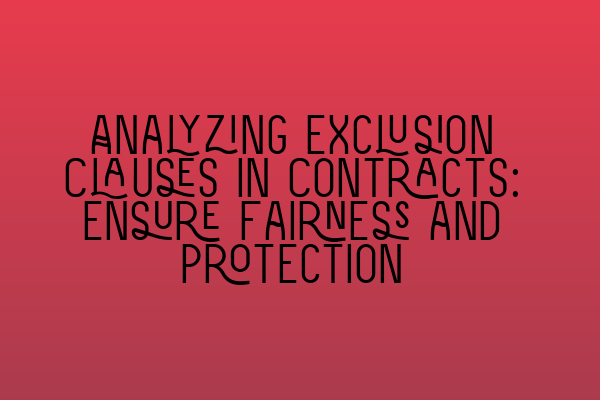Analyzing Exclusion Clauses in Contracts: Ensure Fairness and Protection
In the realm of contract law, exclusion clauses play a crucial role in defining the rights and responsibilities of parties involved. As a solicitor, it is essential to thoroughly analyze these clauses and ensure they are fair, reasonable, and provide adequate protection for your clients. In this blog post, we will delve into the intricacies of exclusion clauses, their importance, and how to effectively scrutinize them to safeguard your clients’ interests.
Firstly, let’s define what an exclusion clause is. An exclusion clause is a provision within a contract that aims to limit or exclude a party’s liability for a certain event or breach. These clauses are commonly utilized to allocate risks and protect parties from unforeseen circumstances or losses that may arise during the course of contractual obligations. However, it is crucial to recognize that not all exclusion clauses are enforceable under contract law, as they must adhere to various legal principles and standards.
When analyzing exclusion clauses, the first step is to examine their scope and limitations. Carefully review the language used and ensure that the clause explicitly covers the specific circumstances or events in question. Ambiguous or vague wording can lead to disputes and render the clause ineffective. As a solicitor, it is your responsibility to interpret these clauses in a manner that aligns with your client’s best interests and the overall intention of the contract.
Furthermore, it is vital to assess the reasonableness of the exclusion clause. The Unfair Contract Terms Act 1977 (UCTA) and the Consumer Rights Act 2015 provide a framework for determining the fairness of contractual terms, including exclusion clauses. These acts protect consumers and vulnerable parties by rendering unfair terms unenforceable. Therefore, it is essential to consider the nature of the contract, the bargaining power of the parties involved, and whether the clause is reasonable in light of the circumstances.
As an SEO expert at SQE Contract Law, we understand the importance of providing comprehensive and insightful information to our readers. Our related articles offer valuable insights and guidance on topics related to mentorship for aspiring solicitors, navigating legal challenges, demystifying the Solicitors Qualifying Examination (SQE), mentorship in the legal journey, and alternative dispute resolution. These articles will enhance your understanding of the legal landscape and equip you with the knowledge to better analyze exclusion clauses.
Mentorship for Aspiring Solicitors: Nurturing Talent in the Legal Field elaborates on the significance of mentorship programs and their role in nurturing the next generation of legal professionals. It provides practical tips on finding suitable mentors and leveraging their guidance to excel in the legal field.
Legal Challenges and Pitfalls: Navigating the Complexities of the Legal System explores the intricacies of the legal system and helps readers navigate potential challenges and pitfalls. It offers valuable insights on how to effectively handle legal disputes and protect your clients’ interests.
Demystifying the Solicitors Qualifying Examination (SQE): What You Need to Know sheds light on the SQE, the new qualifying examination for aspiring solicitors. This article provides a comprehensive overview of the SQE, including its structure, content, and tips for successful preparation.
Mentorship for Aspiring Solicitors: Finding Guidance on Your Legal Journey emphasizes the importance of mentorship in the legal profession and offers guidance on how to find mentors who can provide valuable insights and support throughout your legal journey.
Exploring Alternative Dispute Resolution: An Effective Approach to Legal Conflicts explores alternative dispute resolution methods and their merits as an effective alternative to traditional litigation. It provides an in-depth analysis of various dispute resolution mechanisms and their applicability in different scenarios.
In conclusion, analyzing exclusion clauses in contracts is a crucial task as a solicitor. By ensuring fairness and protection, you can safeguard your clients’ interests and mitigate potential risks. Thoroughly examining the scope, limitations, and reasonableness of exclusion clauses is essential to ensure their enforceability. By integrating the insights provided in our related articles, you can enhance your legal acumen and approach exclusion clauses with confidence. At SQE Contract Law, we strive to equip our readers with valuable knowledge and guidance to excel in the legal profession.
